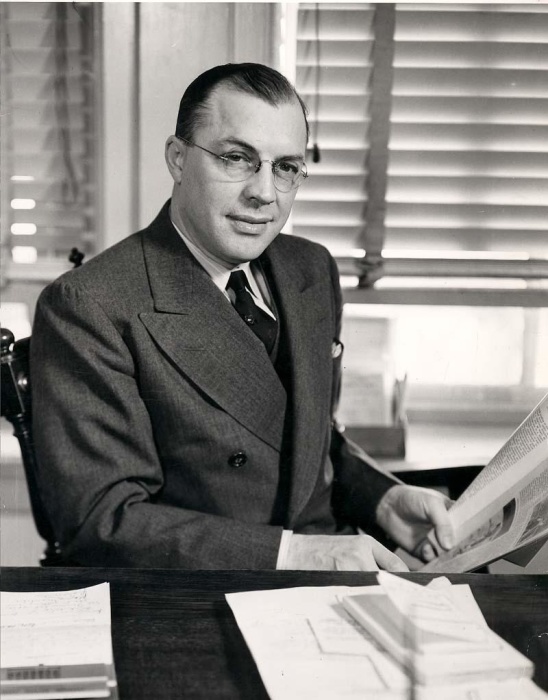Get Today in Masonic History into your Inbox. Sign up today for one of our email lists!
Need an article for your Trestleboard/Newsletter see our Use Policy
Milton Stover Eisenhower Passes Away

Today in Masonic History Milton Stover Eisenhower passes away in 1985.
Milton Stover Eisenhower was an American educator and civil servant.
Eisenhower was born on September 15th, 1899 in Abilene, Kansas. He was raised along with his older brother, future President Dwight D. Eisenhower, in Kansas where he attended local public schools. Milton attended Kansas State University where he graduated in 1923 with a degree in industrial journalism.
From 1928 to 1941, Eisenhower served as Director of Information for the United States Department of Agriculture. In this role he was a spokesman for the New Deal. He was also a key member of OPEDA, the Organization of Professional Employees of the United States Department of Agriculture.
In 1942, Eisenhower was appointed to the War Relocation Authority. This was the U.S. agency responsible for the internment of Japanese Americans during World War II. Eisenhower was strongly opposed to the idea of mass incarceration and at the initial meeting with officials suggested allowing women and children to remain on the West Coast. This was rejected immediately. With options closing to him he suggested a series of other ideas meant to ease the burden of Japanese Americans forced into the internment camps. He established a Japanese American advisory council, a work program allowing some to leave the camps to work on local farms. They had lost workers due to the war and a student leave program for first generation children of Japanese immigrants so they could finish their college educations. He unsuccessfully pushed for the Federal Reserve Bank to protect assets of those who were relocated and for states outside the exclusion zone to allow individuals in the camps to relocate to other states. Eisenhower resigned as director after only 90 days.
In 1943, Eisenhower became president of his alma mater, Kansas State University, a position he held until 1950. During this same he became the first United States chairman of the United States Commission for UNESCO (United Nations Educational, Science and Cultural Organization. When Eisenhower left Kansas State he went to be the President of Pennsylvania State University (1950 to 1956) and then Johns Hopkins University.
Eisenhower was President of Johns Hopkins from 1956 to 1967. During his term as President the University's income tripled and the endowment doubled. He oversaw $76 million in new construction on the campus. He was well respected by both students and faculty. He kept office hours based on when students wanted to come and see him. In turn, Eisenhower was welcome at off-campus student parties.
Eisenhower retired in 1967 and was made President Emeritus. When his successor resigned suddenly in 1971, Eisenhower was asked to return as President. He reluctantly agreed with the stipulation an immediate successor be found. Within 10 months he was replaced and he retired a second time.
Eisenhower also served as a Presidential advisor during his brother's term 1953 to 1961, John F. Kennedy's term from 1961 to 1963 and Lyndon B. Johnson's term from 1963 to 1969. Johnson also appointed Eisenhower as Chairman to the National Commission on the Causes and Prevention of Violence.. The Commission was created in 1968 after the assassinations of Martin Luther King, Jr. and Robert Kennedy. It's purpose was to establish task forces on assassination, group violence, individual acts of violence, law enforcement, media and violence, firearms, and violence in American history.
Eisenhower passed away from cancer on May 2nd, 1985.
Eisenhower was made a mason on sight on November 5th, 1951 by the Grand Master of the Grand Lodge of Pennsylvania. After being made a mason he petitioned State College Lodge No. 700 in State College, Pennsylvania.
This article provided by Brother Eric C. Steele.

